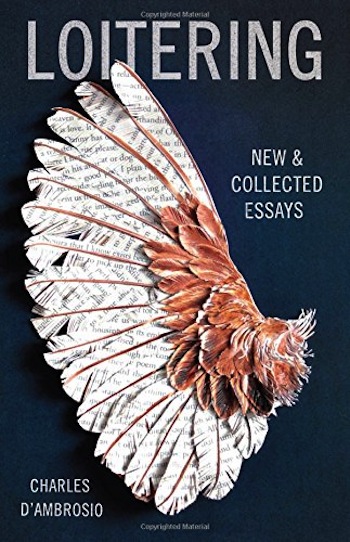Book Review: Charles D’Ambrosio’s “Loitering” — Slam-Bang Ghost Stories
Charies D’Ambrosio’s short fiction collections The Dead Fish Museum and The Point were finalists for the PEN/Faulkner and Hemingway Foundation/PEN Awards respectively, but it is his essays that I return to again and again.
Loitering: New & Collected Essays by Charles D’Ambrosio. Tin House, 280 pages, $15.95.
By Ted Kehoe

Reporting from the scene of a police standoff in Seattle, Charles D’Ambrosio is obsessively and illogically afraid of being shot in the neck. In rural Woodland, Washington, he walks through a grid of model modular homes, intuiting the emanations of aspiration and solace given off by houses in which no one will ever live. In Austin, he entertains politely, even hopefully, the ramblings of—let’s be honest—a crackpot sculptor-cum-pioneer who is laying out his quixotic plans for colonizing the stratosphere. These may sound like examples of macho-gonzo journalism, but they are not. Neither do they serve up neurotic navel-gazing nor screwball adventures.
D’Ambrosio writes ghost stories. About the mental illness and propensity for violence that have plagued generations of men in his family. About the landscape and character of the Pacific Northwest. About Russian orphans and 9/11 and Holden Caulfield and rain and Mary Kay Letorneau and a Texas Pentecostal haunted house and freight trains and a slice of chocolate cake with his dad. Like all convincing ghost stories, they are about loneliness and longing and heartbreak and so, ultimately, about love.
In this volume, Tin House Books collects the pieces in D’Ambrosio’s excellent and impossible-to-find Orphans (a physically tiny book that quickly sold out its similarly tiny first run) along with plenty of wonderful new essays. Orphans was the sort of weird, brilliant, hilarious, wounding book you pressed on friends but wanted returned. It’s about time it was reissued — and expanded so generously to boot. D’Ambrosio’s short fiction collections The Dead Fish Museum and The Point were finalists for the PEN/Faulkner and Hemingway Foundation/PEN Awards respectively, but it is his essays that I return to again and again.
D’Ambrosio’s writing has a slam-bang directness that mixes formal word choice and syntax with slang locutions. His clauses pile up, but his sentences always stick their improbable landings. On hot-rods:
Now auto-shop’s dead, and probably hipsters study art, anyway, but back in the day, a certain, perhaps limited manhood made its way into public by lovingly (and literally) deconstructing one of the culture’s main givens—the car—and metamorphosing it with saws and torches, complex paints and layers of lacquer, until it shed its dull utility and became art—primarily, as [Tom] Wolfe says, sculpture.
Readers may recognize aspects of what they enjoyed in some of David Foster Wallace’s more accessible essays: the incredible reach and facility of language, the bibliographic impulse, the nuanced examination of abstract ideas as they collide with pedestrian elements in modern life. And, as in Wallace’s essays, great pleasure is to be had in the author’s wit: “Anyone born in geographical exile, anyone from the provinces, anyone for whom the movements of culture feel rumored, anyone like this grows up anxiously aware that all the innovative and vital events in the world happen Back East, like way back, like probably France….” But more of the author is present in these essays than DFW was in his work, more of his injuries and more of his seeking. And D’Ambrosio does not just have a sharp eye for odd enterprises and a knack for pithy phrasing. Interspersed throughout Loitering are self-effacing, almost compulsive confessions of his own sad-sack misadventures, like his wretched attack of atopic dermatitis following a reaction to neoprene or his getting buffaloed by a Russian payphone.
If there is a rhetorical tic here, it’s that the author tends toward the contrarian view. Or a contrarian-contrarian stance (it’s complicated). For example, in “Whaling Out West,” he sides with the Makah tribe in its right to hunt whales and against the conservationist view. In “Casting Stones,” he is sympathetic to the inexplicable nature of love in its varied incarnations (this argument would seem to hold true only so far).
But his vaguely mechanical reactions actually work in service of the essays’ larger project, which is to challenge standard sensations and rote arguments. The most painful and mind-bending instance of this is “Degrees of Gray in Philipsburg,” in which he describes getting news of the September 11th attacks while thousands of miles away in rural Montana and feeling…nothing. Because of his geographical remove, the attacks had no impact on his life at that particular moment. And this bald statement of fact drives the essay’s iconoclastic thesis. He goes on to point out that, in truth, some of the victims might well have been awful human beings and that there is nothing so preposterous as saying, after the catastrophe, that “nothing will ever be the same again.”

Charles D’Ambrosio — The principal ghost in this collection is the author himself—fringe-dweller, peerer-through-windows, perennial loiterer.
Each new pronouncement is both truer and more discomfiting than the last. He invokes the poetry of Czeslaw Milosz and Joseph Brodsky and, of course, Richard Hugo, all to articulate the fact that terrible events are a primal part of world history, endemic to the scheme of things, Human existence is inconsequential and yet we cannot resist coming up with futile ways (language) to ascribe meaning. What else have we? While this position may seem calculated to be unsympathetic, the author urges us to resist romanticizing because it stymies our ability to truly see the thing itself.
D’Ambrosio’s family—one brother, a suicide; another, a failed suicide; his father, mysterious and aloof and capricious as God—haunts the pages here. In “Documents,” the writer recalls reading a poem as a child that his father, a professor of finance, had been up all night composing in the grip of a manic episode. He was unreasonably proud of his creation: it was a transparent allegory about his desire to abandon the family. In “Whaling Out West,” D’Ambrosio meditates on procreation as a form of immortality — and goes on to wonder whether he has a responsibility to end his bloodline so that the damage will end with him. In “Documents,” the author recalls sitting in a coffee shop and glancing out the window at a street person gazing in at him. He recognizes, with a start, that this individual — dressed in in thrift store clothing and standing out in the rain — is his schizophrenic brother.
I don’t mean this ghost-story business in some nebulous, abstract way: the essays are all about a presence felt and missed like a phantom limb. The principal ghost here is the author himself—fringe-dweller, peerer-through-windows, perennial loiterer. The limbo of the lonely is never feeling that one fully inhabits one’s own life. Like Anne Sexton’s speaker in “The Fury of Overshoes” (“When will I get there? / Taking giant steps / All day / Each day / And thinking / nothing of it?”), the author longs to feel self-assured, but a sense of belonging and fulfillment forever eludes him. Another spectral leitmotif in the collection is the seductive power of silence. For all his desire to connect, we feel that the author relishes the opportunity to disappear into the page. In the preface to Loitering, D’Ambrosio recalls writing these essays, focusing on the impossibility of providing conclusive answers and tidy determinations. In this way the author invites us to help him make sense of his associations and emotional pivots. There is room here in these essays for the final ghost, which of course, reader, is you.
Ted Kehoe was a teaching/writing fellow at the Iowa Writers’ Workshop. His fiction has appeared in Ploughshares, Epoch, Southwest Review, Prairie Schooner, and Shock Totem. He won Prairie Schooner’s Bernice Slote Award for Best New Author. He teaches writing at Boston University.
Tagged: 9/11, Charles D'Ambrosio, essays, Holden Caulfield, journalism, Loitering: New & Collected Essays, Mary Kay Letorneau, Ted Kehoe
